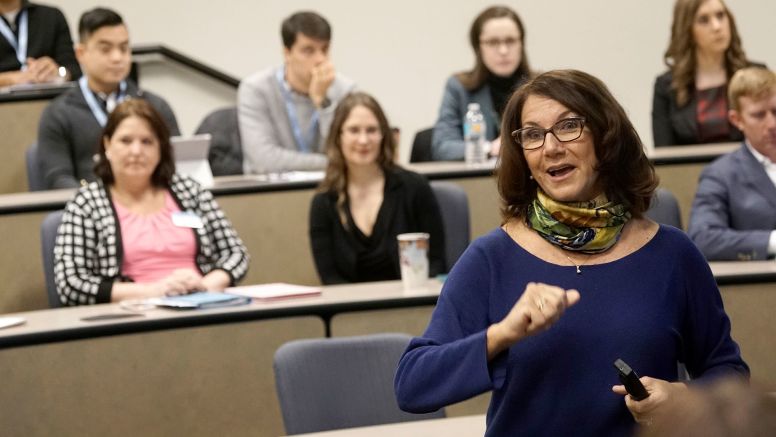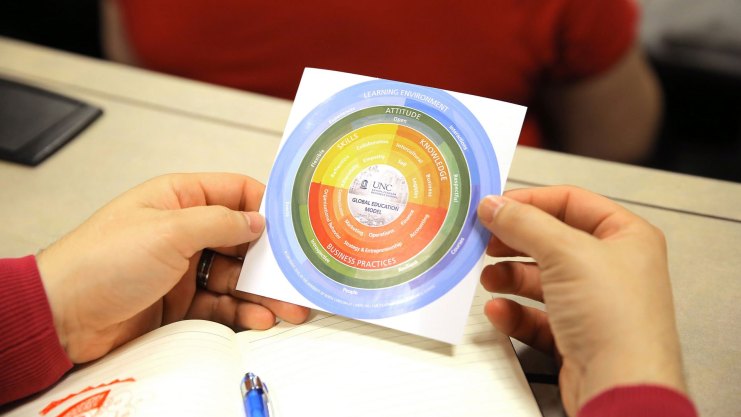News & Stories
What makes an effective global leader?

Business leaders need more than technical skills to be effective in a global market – they also need emotional and cultural intelligence.
Mabel Miguel, professor of organizational behavior at UNC Kenan-Flagler, focuses on global education, inclusive global leadership, and teaching students how to succeed globally.
“At the beginning of your career you get hired because of your technical skills but as your career progresses, the soft skills differentiate you,” Miguel says. Soft skills include attitude, self-management capabilities, and the ability to empathize and build relationships. They are the ingredients for effective global leadership.
The crucial role of attitude
Miguel says attitude is a multiplier. Business leaders should ask themselves, “Is my attitude open? Is it respectful? Is it resilient?” People who answer yes are more inclined to make the most of any and every experience and opportunity.
Part of developing your attitude is exploring and understanding other cultures. Miguel suggests leaders need to be able to interact with and motivate people from different cultures, whether they travel the world, lead virtually or work with diverse teams at home. She says staying open-minded and soaking in new ways of thinking is not only exciting, but key to effective leadership
“Effective global leaders are able to say, ‘This is the way I would do it, this is the way you would do it – together, let’s create a third way,’” Miguel says. In the process, people gain new insights and practices from others.
Managing yourself first
In a global business environment, management capabilities go farther than managing employees. Leaders need to be able to manage themselves. The key is knowing who you are, says Miguel.
“You need to be self-aware so you can manage yourself. Only then are you in a position to understand and manage other people,” Miguel says. “You need to understand what skills you bring to the table. You need understand your values and style.”
If you understand who you are, it will help with managing yourself and others.
“We have so many facets to who we are. Of all of the things you can know about yourself, at the minimum, is your personal style of communicating and leading, values, culture and skillset. That is the foundation for self-awareness,” Miguel says.

Great leaders are able to identify their values and personal style while understanding the same of others. Effective global leaders are able to work with people of different backgrounds, knowing that their perspectives and behaviors are influenced by their cultures and values and are just as important as the leaders’ own. Good leaders withhold judgement of people from different cultures and don’t assume that because they might have different values and approaches that their contributions are not as productive.
“When you work with people who are different from you and believe different things, our knee-jerk reaction is to judge them as wrong,” Miguel says. But effective global leaders are able to listen and see things from another person’s perspective without judgment.
Relationships matter
Showing empathy and being able to connect and build relationships with clients and employees are other factors that make great global leaders more effective.
Americans tend to prioritize the work at hand over building quality relationships, she says.
“Many parts of the world are relationship-oriented, which means they prioritize building the relationship before accomplishing the task,” Miguel says. In other parts of the world, companies and corporations want to get to know the person they’ll be working with.
“That kind of relationship building is essential to task accomplishment,” Miguel says. Having strong working relationships allows for the acceptance of new ideas and opinions. “You can learn by watching people,” she says, understanding how they succeed even when their priority is the relationship.
“We learn from what we see, read and hear. That is also true for effective global leaders and what we apply in the inclusive global leadership development for our students. ”